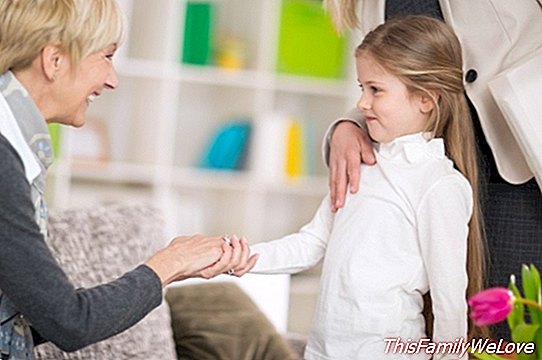Courtesy rules for children to learn to deal with new people

Not talking or trusting strangers is one of the first that children should learn by gaining autonomy. However, there are situations in which the smallest of the house they must deal with new people, at first, such as the teacher at your school, a friend of the parents or a summer camp monitor. In these situations you also have to teach values as important as respect and good education.
Of course, we must also make it very clear to children the situations in which they have to relate to these "strangers" and advise them that under no circumstances should they trust strangers.
Education and good forms
The first day of school, the beginning of a camp, the visit to a house you do not know. All these situations involve contact with "reliable" strangers. In these situations, children must act with full education and with the utmost respect they deserve. These are some tips for these moments:
- Know how to respect the authority. Children must accept that there are certain limits that must be met and one of them is respect for authority. In the case of camp teachers and monitors, it must be clear that they are the ones that rule and that their rules must be followed. In other cases, such as a visit to an unknown house, the child must understand that it is not their home and that therefore it should not disturb the order established in this environment.
- Use the "you". The correct way to address a person who has just met, in the case of adults, is to talk about you. Teachers and other people with whom they interact in the education process should receive this treatment from the children.
- Do not interrupt if it is not urgent. The search for protagonism in this new environment can lead the child to intervene when it does not touch him and interrupt conversations in which he does not participate. The youngest must respect the speaking time and if they want to integrate in these talks, do so without altering the order of them.
- Answer when asked. If the teacher, or the father of a friend in someone else's house, asks the child something, he or she must respond with as much education as possible and without going around the bush.
Mistrust in strangers
As has been said, there are situations in which trust In unknown persons, he responds to situations such as knowing a teacher on the first day of school or the father of a friend when going to play at home. But usually, the smallest must know how to keep the distance with strangers. Here are some tips to educate your children in this regard:
- Warn, despite the risk of producing the child some anguish, the dangers that can be found on the street and explain how to avoid them.
- It is not about instilling in the child a total distrust towards every person, but to make him understand that there are bad people who hide among the good.
- The drama we show in our warnings should always be proportionate to the sensitivity of the child, we should not cause unnecessary anxieties and fears.
- Make clear that in case of trouble, you do not have to go to any person, but to a police officer or enter a store to ask for help.
- There are situations in which a stranger can come to talk to the child and give his own name, in this way, to imply that he is "no longer a stranger". It should be made clear that this situation does not exempt the risks and insist that, even if someone tells you what you call or even affirm that you know the parents, you should not talk to them or approach them.
Damián Montero




